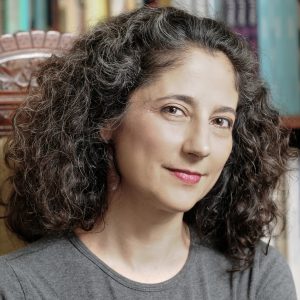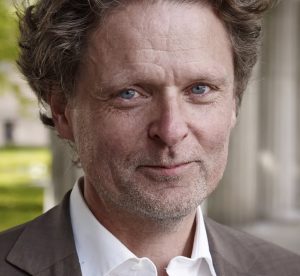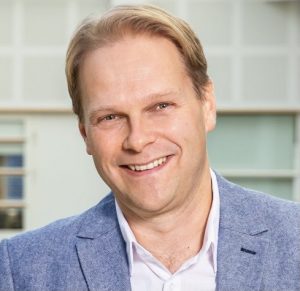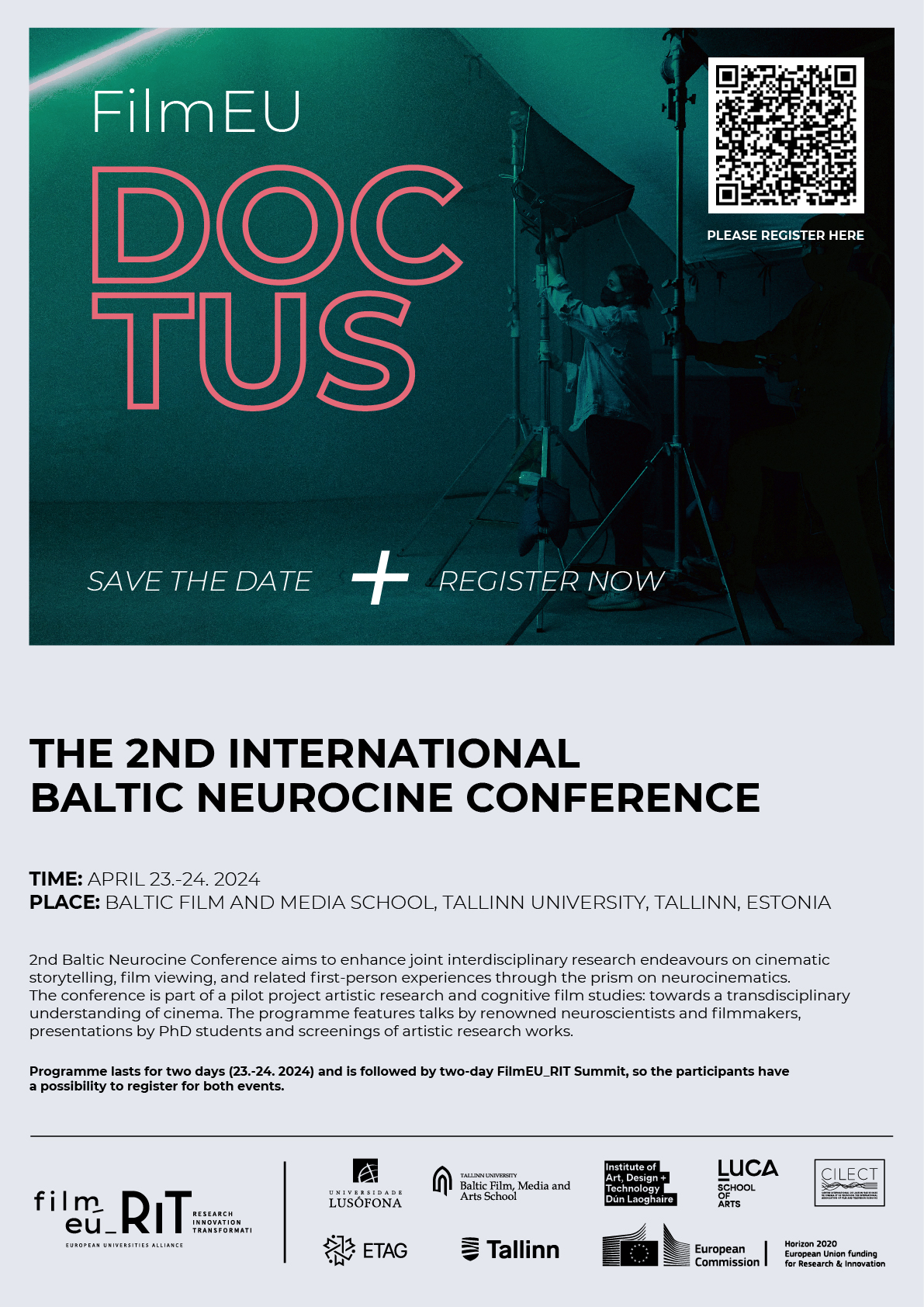NeuroCine conference
2nd Baltic Neurocine Conference
Purpose
Tallinn University/FilmEU welcomes scholars and creative professionals to contribute to the 2nd Baltic Neurocine Conference. The conference aims to foster interdisciplinary research on cinematic storytelling, film viewing, and related first-person experiences. Alongside the conference call, we are also opening a call for papers for the special issue on "Cinematic Minds Behind the Screens", which will be published by the International Journal of Film and Media Arts (IJFMA), Vol. 10 No. 2.
Fields of Study
The paradigm of 'neurocinematics' (Hasson et al. Projections 2008), refers to experimental studies that apply neuroimaging methods to study the functional brain of several film viewers, allowing generalisation over individuals in terms of what is called intersubject correlation (see reviews Jääskeläinen et al. 2020, 2021; Tikka et al. 2023). However, it has become evident that neuro-physiological measurements alone do not suffice to fully understand how the neural data of film viewers relates to the temporally unfolding narrative content they have been viewing on one hand, and film viewers’ embodied first-person experiences on the other.
Another issue the 2nd Baltic NeuroCine Conference addresses is that, so far, the focus of neurocinematics has mainly been on the film viewers, while the study of professional filmmakers has been to a great extent neglected. This is why we turn the attention also to the filmmakers. We ask, how experiences and actions of filmmakers could be addressed using neurocinematic methods? Could the accumulated understanding of the film viewers provide some clues for such an endeavour? What type of challenges such a study program might face?
We trust that by associating accumulated knowledge from distinct domains will allow a more holistic window to the phenomena under scrutiny. Hence, the 2nd Baltic NeuroCine Conference invites both local and international colleagues to join the effort of bridging the explanatory gaps between (1) neuro-physiological observation data, (2) first-person experiential data, and (3) descriptive data of the experienced film content.
Keynote speakers

Karen Pearlman
Keynote speaker
Macquarie University, Sydney
karen.pearlman@mq.edu.au
Karen Pearlman writes, directs, and edits screen productions. She researches creative practice, cognition, and film histories. Karen’s trilogy of short films about historical women editors (2016, 2018 & 2020) have won 34 highly competitive national and international awards from peak industry bodies and film festivals, including 3 for best editing, 4 for best directing and 7 for best documentary. Karen is the author of the widely used textbook on editing, ‘Cutting Rhythms’ (Focal Press) now in its 2nd edition and with translations into Chinese, Korean, Arabic and Turkish. Her work has reached audiences of nearly 2 million people through collaboratively made research communication videos called ‘The Science of Editing’. Karen is an Associate Professor in Screen Media at Macquarie University, Sydney, where she is a deputy director of Macquarie Uni’s ‘Creative Documentary Research Centre’. She is member of the Board of the Society for Cognitive Studies of the Moving Image, and has a monograph on filmmaker Shirley Clarke under contract with EUP.

Michael Pauen
Keynote speaker
Humboldt University, Berlin
michael.pauen@hu-berlin.de
Michael Pauen is a philosopher with a focus on the philosophy of mind. As the academic director of the Berlin School of Mind and Brain, he has extensive experience in interdisciplinary research and training. Having a specific interest in philosophical and psychological aspects of human sociality, he focuses on social intelligence both in humans and in artificial systems.
http://www.michael-pauen.org/Index.html

Lauri Nummenmaa
Keynote speaker
University of Turku, Turku
latanu@utu.fi
Professor Lauri Nummenmaa leads the Human Emotion Systems laboratory at Turku PET Centre and Department of Psychology, University of Turku. His group studies functional and molecular neural mechanisms of human emotions and social interaction in complex, life-like settings with magnetic resonance imaging, positron emission tomography, magneto- and electroencephalography and behavioural techniques. He has written over 100 scientific articles on brain basis of emotions and social cognition. Currently his lab’s research is funded by the European Research Council, the Academy of Finland, The Sigrid Juselius Foundation and the Emil Aaltonen Foundation.
Submissions
Abstract submissions via NeuroCineBFM@tlu.ee
2nd Baltic NeuroCine conference Submissions
We look forward to proposals that target a broad audience beyond disciplinary niches in one of the following presentation categories:
- Presentations including Q&A (30 min)
- Presentations by filmmaker-scientist pairs including Q&A (40 min)
- Doctoral student case studies (20 min)
- Workshop proposals
- Demonstrations or screenings related to the theme
Submit abstracts of 350-500 words with five literature references via email to NeuroCineBFM@tlu.ee.
When submitting to the conference, please indicate your preferred type of presentation in one of the above listed categories (1-5). Also write in the email heading (1) “Conference submission” if you are submitting only a conference presentation abstract; (2) “Conference and journal submission” if you are submitting both to conference and journal simultaneously; (3) “Journal submission” if you are submitting only to the journal).
International Journal of Film and Media Arts Submissions
Simultaneously with the conference call we also open a call for papers to appear in the issue on "Cinematic minds behind the screens" to be published by the International Journal of Film and Media Arts (IJFMA), Vol. 10 No. 2, first semester 2025. See info about IJFMA at https://revistas.ulusofona.pt/index.php/ijfma/about
We accept long research articles (4000 – 7500 words w/o ref) and short articles and commentaries (2000 – 2500 words w/o ref). NB! Submitted papers need to follow Submission guidelines. All full paper submissions go through the double-blind peer review process.
No fees are requested for submission or processing. IJFMA is licensed under a Creative Commons Attribution Licence that allows others to share the work with an acknowledgement of the work’s authorship and initial publication in this journal. Read more at https://creativecommons.org/licenses/by-nc/4.0/
Submit abstracts of 350-500 words with five literature references via email to NeuroCineBFM@tlu.ee.
CONTACT EDITORIAL TEAM at NeuroCineBFM@tlu.ee
Maarten Coëgnarts https://www.filmeu.eu/alliance/people/maarten-coegnarts
Elen Lotman https://www.filmeu.eu/alliance/people/elen-lotman
Pia Tikka https://www.etis.ee/CV/Pia_Tikka/eng
Follow updates on: http://enactivevirtuality.tlu.ee/
Doctus
DOCTUS: Neurocinematics
Tallinn University will host a DOCTUS seminar as part of the 2nd Baltic NeuroCine Conference from 23-24 April 2024. The NeuroCine Conference features side-by-side presentations from established scientists and also PhD students, so it will be an excellent opportunity for DOCTUS participants to see their peers presenting and participate in the Q&As, learn about neurocinematics and cognitive film studies, both in terms of content and methods.
The conference is part of FilmEU_RIT’s pilot project Artistic Research and Cognitive Film Studies: Towards a Transdisciplinary Understanding of Cinema. The 2-day conference will be followed by the FilmEU_RIT Summit on April 25th and 26th. All students engaged with the Doctus initiative are also invited to partake in the Summit as well.
To register, please submit a short proposal by 22nd of March, 2024.

Registration
Registration is open until April 17th, 2024.
Program
Please find the 2nd Baltic NeuroCine conference program below.
BalticNeurocine2024 program in Sched
Vimeo:
NeuroCine live-stream April 23
NeuroCine live-stream April 24
Youtube:
NeuroCine live-stream April 23
NeuroCine live-stream April 24
Acknowledgements
The 2nd Baltic NeuroCine Conference has been made possible by:
FilmEU_RIT pilot grant Artistic Research and Cognitive Film Studies: Towards a transdisciplinary understanding of cinema (ARCF) project.
Baltic Film, Media and Arts School (BFM), an institute with wide-based international education curricula embedded in the interdisciplinary community of Tallinn University. BFM BA, MA and PhD level study programs both in Estonian and English offer tools and skills for working on various positions in film production, TV, new media, communication, choreography, art and music. The institute's Centre of Excellence in Media Innovation and Digital Culture (MEDIT) studies cultural change and innovation processes of digital media and offers a possibility to conduct artistic research in the field of audiovisual arts.
The Baltic NeuroCine research group at BFM is led by the research professor Dr. Pia Tikka and cinematographer Dr. Elen Lotman. Activities of the conference are also supported by Pia Tikka's 5-year team grant "Cinematic minds behind-the-scenes: A neurophenomenological window to filmmaker's enactive cuing of expectations" (PRG2109) awarded by the Estonian Research Council (2024-2028).
The FilmEU European University is co-funded by the Erasmus+ Programme of the European Union. The FilmEU_RIT Research, Innovation and Transformation project has received funding from the European Union's Horizon 2020 Research and Innovation Programme. FilmEU Ref. 101004047, EPP-EUR-UNIV-2020 | FilmEU_RIT Ref: 101035820, H2020-IBA-SwafS-Support-2-2020 | ERASMUS-EDU-2023-EUR-UNIV Project: 101124314.
Views and opinions expressed are however those of the author(s) only and do not necessarily reflect those of the European Union, Erasmus Plus or Horizon 2020. Neither the European Union nor the granting authority can be held responsible for them.
Conference live-stream
Vimeo:
NeuroCine live-stream April 23: https://vimeo.com/event/4244366
NeuroCine live-stream April 24: https://vimeo.com/event/4244373
Youtube:
NeuroCine live-stream April 23: https://www.youtube.com/watch?v=mFhmy8O04TY
NeuroCine live-stream April 24: https://www.youtube.com/watch?v=GIeAfXsswXE
